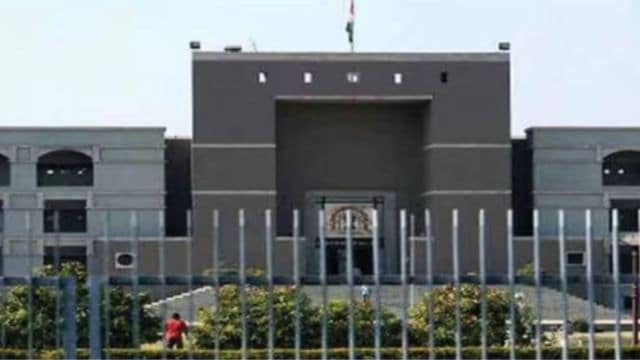Set in place a policy on rehab & compensation for Silicosis-affected workers: Gujarat HC to state
In its 2016 order, the SC had issued directions to pay a compensation of Rs 1 lakh to the kin of deceased from Silicosis
 The Gujarat HC, in its August 1 oral order, said “... We find that effective steps have not been taken at the ends of the concerned department of the State" (Archive)
The Gujarat HC, in its August 1 oral order, said “... We find that effective steps have not been taken at the ends of the concerned department of the State" (Archive)The Gujarat High Court recently directed the Principal Secretary of the Department of Labour and Employment of Gujarat to take effective steps to bring about “suitable amendments” to a Government Resolution of March 2024, to set in place a policy for the rehabilitation of Silicosis-affected workers.
The court also directed the state to provide adequate compensation to the kin of the deceased, due to Silicosis, in line with the 2016 and 2017 orders of the Supreme Court in a 2006 Writ Petition.
A Division bench, of Chief Justice Sunita Agarwal and Justice DN Ray, was hearing a petition filed by the People’s Training and Research Centre (PTRC) as well as the next of kin of 19 deceased persons, seeking compliance of a March 11, 2024 Gujarat government resolution to “enhance the financial assistance” in compliance of the Supreme Court decision dated April 11, 2017.
The Gujarat HC while issuing the oral order considered the submissions made by the petitioner and the respondents in the case and an order of the Supreme Court of August 6, 2024, which directs the Chief Secretaries of state, including Gujarat, to “ensure that adequate compensation is received by the affected workers or their next of kins as swiftly as possible”.
The Gujarat HC, in its August 1 oral order, said “… We find that effective steps have not been taken at the ends of the concerned department of the State… It is evident that there is a substantial delay on the part of the officers of the State in effective implementation of the directions (of 2016 and 2017) of the Apex Court, which has resulted in granting lesser benefits to the applicants, who had submitted applications after (the SC orders). Moreover, the timeline of 90 days for moving such an application is practically not feasible and it seems that there has been no application of mind to the recommendation for increasing the timeline looking at the sensitivity of the matter and the social fabric of the society. The Government resolution dated March 11, 2024 does not provide for rehabilitation of the victims, which has resulted in rejection of the applications of some of the beneficiaries petitioners herein.”
The court order said, “We, therefore, direct the Principal Secretary, Department of Labour and Employment to look into the matter and take effective steps for bringing suitable modifications / amendments / substitution of the Government
resolution dated March 11, 2024 so as to set in place the policy for rehabilitation of the affected workers with the disease ‘Silicosis’ and to provide adequate compensations to the kin of the deceased died due to ‘Silicosis’, in the true letter and spirit of the decision of the Apex Court.”
Directing the Principal Secretary of the Department of Labour and Employment to file an affidavit in compliance with the directions on the next date of hearing on August 29, the Gujarat HC said that claims of the 19 beneficiary-petitioners “shall be given fresh consideration in light of the decision of the Apex Court for providing adequate compensation and the claims of those, which have been rejected on the ground of delay, shall be considered afresh on merits.”
The court further said that the Chief Labour Commissioner of Gujarat is “required to take appropriate steps” for the consideration of claim of the beneficiaries and a policy in strict compliance of the orders of the Supreme Court “shall be set in place by issuance of a fresh Government resolution, wherein effective date is also to be suitably indicated.”
In its 2016 order, the SC had issued directions to pay a compensation of Rs 1 lakh to the kin of deceased from Silicosis as well as deposit an amount of Rs 2 lakh in each of their names in fixed deposit to allow the next of kin to avail the monthly interest accruing from the deposit, based on a recommendation of the National Human Rights Commission (NHRC).
The NHRC had conducted a survey regarding the problem of ‘Silicosis’ affecting people working in stone mines and other silicon dust producing plants as per the SC direction. The SC had directed the Chief Secretaries of each state to make all arrangements facilitating the survey and preparation of reports in cases of Silicosis as well as “for detection of such disease amongst the workers of the weaker sections and issuance of appropriate guidelines in the matter of prevention and treatment of ‘Silicosis’ and other occupational disease, including for compensation, medical treatment and other rehabilitation measures,” the Gujarat High court order states. It was noted by the Supreme Court in the said 2016 order that severity of the problems is prevalent mainly in the states of Delhi, Haryana, Rajasthan, Madhya Pradesh, Gujarat, Jharkhand and Puducherry. The SC had issued further directions in an order in April 2017. The petitioners had contended that though the Gujarat government had framed the policy for providing compensation with the last resolution dated March 3, 2024, the prevailing policy was “not in compliance with the directions” of the SC order. The HC order also noted that the petitioners had pointed out that “no policy for rehabilitation of persons affected with the disease ‘Silicosis’ was framed in the State of Gujarat”, as per the recommendations of the NHRC, “which is also clear from the admission in the affidavit filed” on behalf of one of the respondents, the Chief Labour Commissioner of Gujarat, the HC noted. Therefore, “lesser benefits were provided to the beneficiaries” as against the decision of the Supreme Court.







